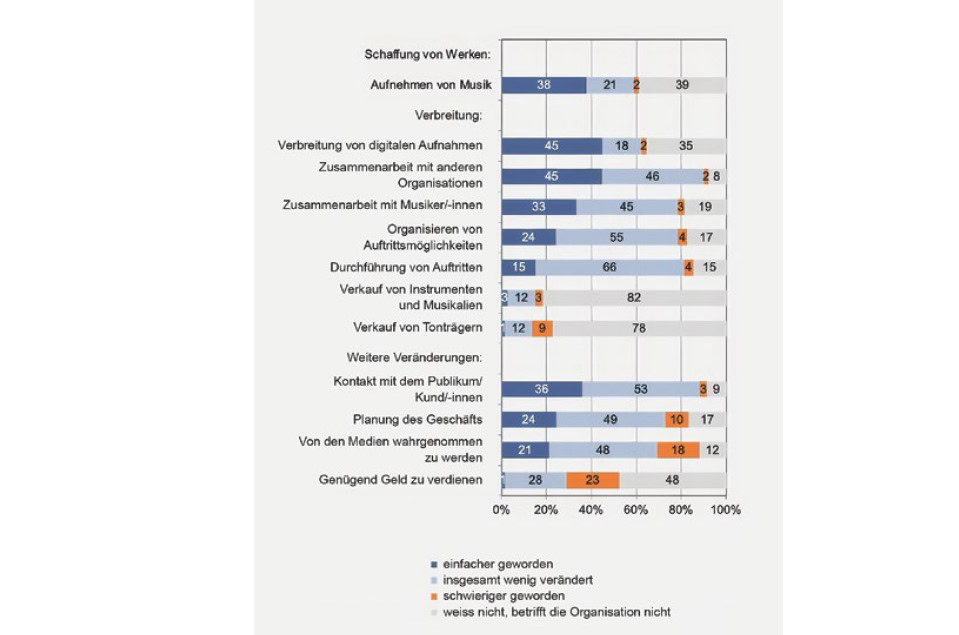Studying music online - emergency solution or vision
The pandemic-related switch to online studies seems to have caused few problems for many students. But for music students too?

Michael Bühler - From one day to the next, lecturers and students shifted their everyday educational routine from the familiar environment to video conferences or breakout rooms, which were still very often unfamiliar at the time - regardless of whether they were afraid of them and technically equipped or not.
Numerous studies have already investigated how students generally deal with the new situation and what it means for them.
But to what extent do these findings also apply to music students? This mood barometer shows how Kalaidos music students are experiencing the pandemic.
For those who had already completed at least part of their studies from home in online classes before the first lockdown and had therefore already arranged their social interaction and private life accordingly, the abrupt change should have been easier - this conclusion at least seems logical. And in fact, it also applies to many students in the health or business administration sector, among others.
According to internal surveys by the Careum School of Health1 and the Kalaidos Economics Department2 , the transition to distance learning was quick and relatively smooth, as they were already using digital tools such as Zoom in the classroom before coronavirus.
Respondents commented positively on the time and money saved by not having to travel to campus, the improved work-life balance, easier family care and the ability to move around more during face-to-face events thanks to the headset. On the other hand, the lack of social contacts, the lack of awareness that one is studying, access to literature and libraries, the low-threshold or technical discussion of the subject matter during breaks were negative.
And how have students majoring in music experienced this change? Music as an emotional art thrives on the direct, interpersonal exchange of feelings - both between performers when making music together, as well as in the dynamic, emotional exchange of energy between artists and audience, which - from a micro-sociological perspective - is of central importance, not least for the cohesion of our society.
The following assessments are based on a qualitative oral and written survey conducted in November 2021 among music students at the Kalaidos University of Music. The survey results are to be understood as a barometer of opinion and do not claim to be representative.
In general, it can be stated that the majority of respondents had predominantly good experiences with the online teaching offered. The fact that this was already an integral part of teaching activities before the pandemic seems to have had a positive effect on the evaluation, as lecturers in particular were familiar with the technical means and the pedagogical challenges of online teaching (e.g. strenuous screen time, distraction in the home environment, or shortened concentration span).
While the majority of students in the fields of business or health stated that they were able to make their studies more efficient, i.e. less time-consuming and less expensive, as there was no need to travel to university, for example, the majority of the music students surveyed focused less on economic and more on qualitative considerations.
For example, the majority of respondents were positive about the opportunity to better integrate their studies into their everyday working or family life, or to take individual account of their own ability to absorb or concentrate.
As noted, students in the fields of health or business found it easier to deal with social isolation if they had already "practiced" online teaching before the pandemic. In contrast, social contact for music students seems to be much more difficult to substitute with online offerings. It is not uncommon for various responses to express difficulties in the absence of social or societal exchange with fellow students. The consequences range from a lack of motivation and energy to practice at home for the usual 6 to 8 hours to frustration and loneliness.
With regard to the technical challenges, qualitative difficulties typical for music students are expressed, so that the transmission quality of the music is perceived as inadequate in order to work on interpretational aspects or timbre. In digital interaction, the time delay - even if it is now only a few tenths of a second - continues to unsettle the majority of respondents.
Considering these technical difficulties and the lack of energy exchange between performers and audience, it is not surprising that audition activities have been reduced to the closest circle of family or friends, or have come to a complete standstill. And this is where another problem becomes apparent for some: the lack of recognition from the audience.
For the next lockdown - which will hopefully never happen - the respondents would unsurprisingly like to have more contact with other students, e.g. in online seminars, guided learning groups or interdisciplinary working groups.
The ideas of a permanent, optimal music hybrid study program diverge greatly in this survey. According to a slight tendency, however, it does not seem entirely out of the question in the opinion of the respondents that theory lessons up to 100% and the main subject lessons up to 40% will shift to the digital world in the post-corona era.
So let's hope that universities and universities of applied sciences consciously take up this challenge and make sustainable use of the positive effects of this challenge.
Sheet music
1 Conrad, C., Frech, M., Käppeli, A. (2021). Digital teaching and learning in higher education.
2. Willi Kägi, I. (2020). Livestream lessons from a student perspective.








